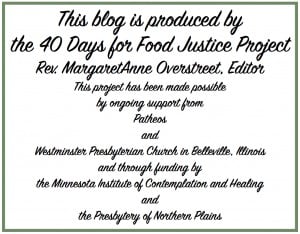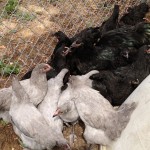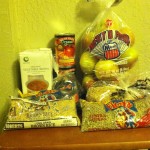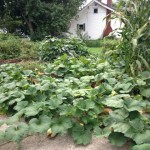At the core of this question is a conversation about sustainability.
In the service of greater productivity and with a mandate to feed the world, our industrial food system embraces chemical pesticides and herbicides, petroleum-heavy fertilizers, genetically-modified versions of crops, and confined feedlots.
Despite these ‘advancements’ in agriculture – which pose environmental, health, and animal welfare concerns – there are still more than 800 million people around the world who are undernourished. Additionally, every year 2.6 million children die from hunger-related causes.
Thoughout the scriptures, humankind is tasked with caring for one another and tending to the created world in responsible ways. Serving either of these commands requires that we act in ways that attend to more than solely our own pleasure or profit.
The agricultural system is not excepted from this expectation. In Exodus 23, care for the poor, the farmworkers, the land, the farm animals and the larger ecosystem is insured by a widening of the Sabbath commandment.
As consumers, the power of our food dollars gives us the power to change our food system and to call our food producers to greater accountability on questions of sustainability.
As the people of God, the prompting of the Holy Spirit and the teachings of scripture nudge us to make choices in every aspect of our lives – even our food choices – that foster a more abundant life for all peoples and all of creation. Consequently, we are not permitted to ignore injustices, whether they are done to the land by agribusiness, to the farmer by governmental policy, to the farmworkers by food producers, or to the animals bound for our table by meat producers. Nor are we permitted to ignore the ways that our food choices are complicit in these injustices.
A greater awareness of how our food was grown or raised, in addition to a better understanding of how it came to our table, helps us better understand these justice issues and allows us to foster more just behaviors by supporting them with our food dollars.
———————————-
Lenten Calendar for FEBRUARY 28
Read Isaiah 25: 6-10. Consider what it means to “feast”. What does God’s abundance look like?
————————————
Sign up to receive the daily meditations by email, or like us on Facebook.
We need your stories!
We’re already looking ahead to the 40 Days for Food Justice Project for 2016 and we’re looking for more stories, experiences, prayers and resources about food justice and food injustice.
If you would like to contribute – or would like to recommend a contributor – please send us an email and let us know.
About:
In addition to being the founder and editor-in-chief of the “40 Days for Food Justice Project”, the Rev. MargaretAnne Overstreet is a mom, a Presbyterian pastor, and a certified Health Coach. She does ministry with and among the good people of Westminster Presbyterian Church in Belleville, Illinois, where she gets her hands dirty in the community garden and, every Sunday, preaches with bare feet. She treasures family time, relishes every opportunity to teach and write about food justice, and loves to play outside with her dogs. Find out more about her at www.AnInBetweenPlace.com













